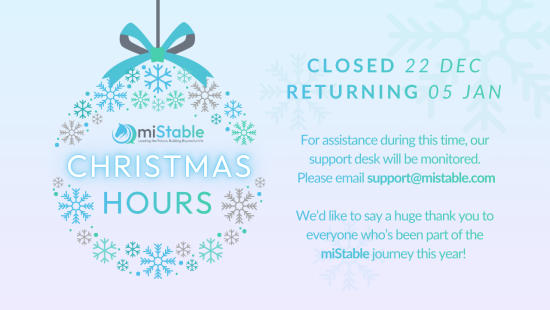Understanding Email Deliverability
Tuesday 20th October, 2020
To ensure your updates are delivered successfully, efficiently and securely, miStable uses the world's #1 email platform, SPARKPOST.
To put it into perspective, SPARKPOST is responsible for the deliverability of emails for the US Presidential Campaigns!
Deliverability rates are 99%
With Sparkpost, miStable can track when an update is composed, sent, received (or rejected) and in most cases, Opened (this response is determined by the recipient).

Why is an update status "Sent" but not in my Inbox?
A miStable Update is marked as "SENT" when a Recipient's Email Provider (Bigpond, Google, Hotmail etc) accepts it.
Where the Email Provider then displays the update is dependant on a recipient's email security settings.
If the update is not visible in their INBOX, they will need to check JUNK/SPAM folders.
With COVID has come an increase in web/email hoaxing and hacking. Email providers and their clients have responded by increasing security levels.
If you have customers who are experiencing issues with mail not being delivered to their Inbox, they will need to add mistable.com AND m.mistable.com to their Safe Senders List.
Reasons for an update being rejected?
A "Failed" email is a result of an Email Provider rejecting the update on the basis of an invalid email address, the recipient unsubscribed or marked the sender as spam.
To protect our sending reputation, we take these rejections seriously and the Failed emails with the above reasoning, will be added to our Suppression List until the email has been amended.
You can view and remove Suppressed Emails from your miStable Dashboard in the Failed Email section.
Tips to improve mail deliverability.
- The content of the subject line and email body is particularly important in how an email is perceived. Email providers work hard in preventing their clients from being spammed.
- Instructive emails such as BUY NOW, PURCHASE YOUR SHARE etc. can be received with caution. "If in doubt, send to spam" approach is generally taken.
- Don't use third party contact lists. They are generally unreliable and out of date, resulting in high bounce rates which affect our reputation to deliver. Not to mention, it is illegal to buy third-party email lists (Can-Spam Act).
- Make sure you have legitimate first and last names for your contacts. Don't use characters (eg. full stops) or text such as "NA" to complete a field.
- Delete abandoned email addresses from your contact list. If someone hasn't opened your emails in a longtime, consider deleting them.



